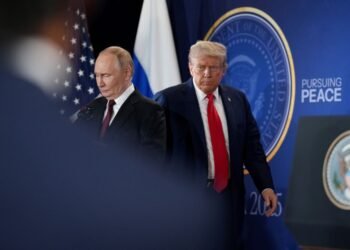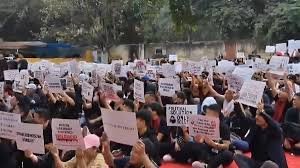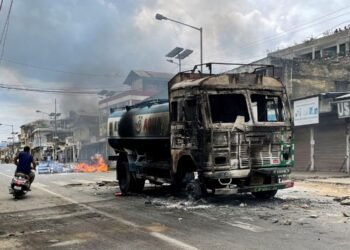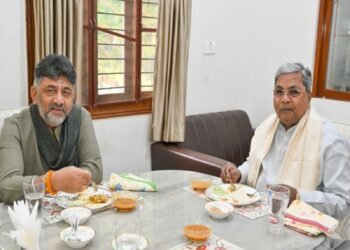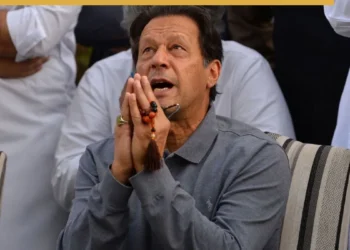In a thought-provoking trialogue at the India International Centre, legal experts, judges, and academics came together to explore the challenges and evolving dynamics of the separation of powers within India’s democracy
By PC Bureau
The emphasis on separation of power among the various organs of democracy came udner intense scrutiny at a trialogue organised by The Justice Ajay Kumar Tripathi Foundation (JAKTF) titled Samvaad at the India International Centre, New Delhi.
The event, which drew judges, legal experts, academics, and distinguished members of the legal and non-legal fraternity, delved into the evolving dynamics of the separation of powers within the Indian constitutional framework.
The esteemed panel for the event included Hon’ble Justice Dr. S. Muralidhar (Retd.), former Chief Justice of the Orissa High Court; Mr. Mahesh Jethmalani, Senior Advocate at the Supreme Court of India; and Mr. Pavan K. Varma, former Ambassador of India to Bhutan. The session was moderated by Ms. Shahrukh Alam, Advocate at the Supreme Court.
The event began with a heartfelt tribute to Justice Ajay Kumar Tripathi, remembered as a jurist who “did not merely interpret the law, but breathed life into it.” His contributions were celebrated by the Foundation, which emphasized its commitment to preserving his legacy through ongoing dialogues on critical constitutional issues.
Ms. Alam set the stage by addressing the separation of powers among the judiciary, legislature, and executive. She raised pertinent questions about the balance of power and the increasing frictions that arise when these domains are overstepped. Some of the key themes explored during the discussion included the role of populism and majoritarianism in shaping legal and political power, the interaction between courts and populism, and the extent to which judges are held accountable within the framework of constitutionalism.
The Executive’s Perspective
Mr. Pavan K. Varma, representing the executive’s viewpoint, discussed the foundational structure of India’s Constitution. He highlighted the vision of the founding fathers in establishing a republic and parliamentary democracy, with the separation of powers as a key principle. However, he expressed concerns about the erosion of this ideal in practice, especially with the weakening of the bureaucracy, once known as the ‘Steel Frame of India.’
Mr. Varma recalled how the once-robust bureaucracy had become compromised by personal interests, undermining its role as a check on legislative power. He noted how the fusion of the executive and legislature’s agendas has led to a monopolization of power, making it increasingly difficult to challenge in real life. Reflecting on the rise of majoritarianism, he observed that overwhelming parliamentary majorities could lead to laws being passed without sufficient debate or opposition, eroding the balance of power in the legislative process.
He also touched on concerns regarding judicial independence, citing instances where retired Chief Justices are offered lucrative post-retirement assignments, potentially compromising their impartiality. Drawing attention to judicial overreach, Mr. Varma argued that the judiciary sometimes steps into executive territory when the latter fails to fulfill its responsibilities, citing instances where the judiciary has been tasked with administrative issues, such as the frequency of garbage collection.
The Legislature’s Perspective
Mr. Mahesh Jethmalani, representing the legislative viewpoint, began by reflecting on Montesquieu’s seminal work The Spirit of the Laws, which passionately advocated for the separation of powers as the foundation for good governance and the prevention of tyranny. While Montesquieu’s doctrine finds no explicit mention in the Indian Constitution, Mr. Jethmalani noted its influence on the judicial interpretation of separation of powers.
He pointed out that the Indian Constitution envisions a balance between the executive and legislature, emphasizing their harmonious interaction for good governance, as highlighted by Dr. B.R. Ambedkar during the Constituent Assembly debates. Mr. Jethmalani also discussed the constitutional power of judicial review, where the judiciary, through Articles 226 and 32, oversees the actions of the executive.
The trialogue provided a platform for meaningful dialogue on the intricate relationship between the branches of government and the challenges in maintaining a balance of power within India’s democracy. The discussions reaffirmed the importance of preserving the integrity of the Constitution and fostering accountability within each arm of the state to ensure a thriving democratic framework.
The session concluded with an expression of gratitude for Justice Tripathi’s lasting legacy and an acknowledgment of his significant contributions to the Indian judicial system.
Justice Dr. S. Muralidhar presented the judiciary’s perspective, beginning with a thought-provoking question: “How much do we value democracy?” He emphasized that Dr. B.R. Ambedkar’s concept of constitutional morality was not merely about adhering to the text of the Constitution, but about ensuring that those in power act in accordance with its values. According to Justice Muralidhar, one of the first questions to ask when discussing the different organs of the state is how democratic these organs truly are. He echoed Mr. Pavan K. Varma’s sentiment about the erosion of democratic values over the past 75 years, and aligned with Mr. Mahesh Jethmalani’s view on the impracticality of the ideal separation of powers.
Justice Muralidhar argued that separation of powers would remain ineffective unless each institution operates democratically and wields its power responsibly. He cautioned that the irresponsible use or neglect of power could undermine the entire constitutional structure.
He then addressed the non-democratic nature of how India’s institutions are structured. He observed that values such as fraternity, liberty, and equality had not been fully internalized or practiced within the functioning of the state organs. The growing influence of the Chief Minister’s Office (CMO) and Prime Minister’s Office (PMO) in governance, he argued, has resulted in a concentration of power in the hands of the head of the executive and trusted bureaucrats, further shifting the balance of power away from its intended distribution.
Justice Muralidhar also highlighted concerns within the judiciary itself, describing it as one of the least democratic institutions. He questioned the concept of the master of the roster, which grants one individual, the Chief Justice, significant power over the distribution of judicial business. He criticized the concentration of administrative power in the hands of a single person, acknowledging that this structure implicitly places a great deal of power in individuals, which requires deep reflection and reform.
Turning to the issue of checks and balances, Justice Muralidhar pointed out key moments in Indian legal history where the judiciary has acted as a check on the other branches of government. He praised the Keshavananda Bharti case, which marked the judiciary’s first major intervention in limiting the powers of Parliament, asserting that a parliamentary majority cannot simply rewrite the Constitution or abolish fundamental rights. He also recalled the SR Bommai case, which upheld the necessity of parliamentary ratification for the imposition of President’s Rule, reinforcing the judiciary’s role in safeguarding democratic principles.
However, Justice Muralidhar also noted that the judiciary’s own power of judicial appointments is limited when the process is influenced by the Prime Minister’s Office. He further reflected on the impeachment process for judges, pointing out that although the legislature has the power to impeach judges, the process can be thwarted when the ruling party abstains from voting, effectively defeating the motion. While the impeachment scheme itself is well-structured, he cautioned that there are ways to subvert these mechanisms, undermining their intended purpose.
In conclusion, Justice Muralidhar called for a profound reexamination of the functioning of India’s institutions to ensure they live up to the values enshrined in the Constitution, and emphasized the need for greater democratic accountability across all branches of government.



